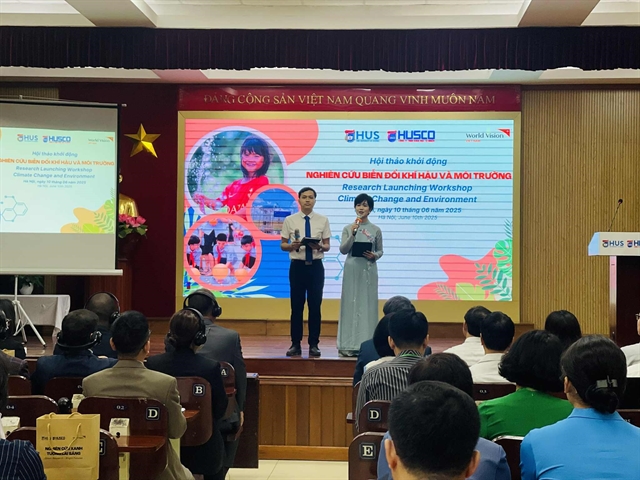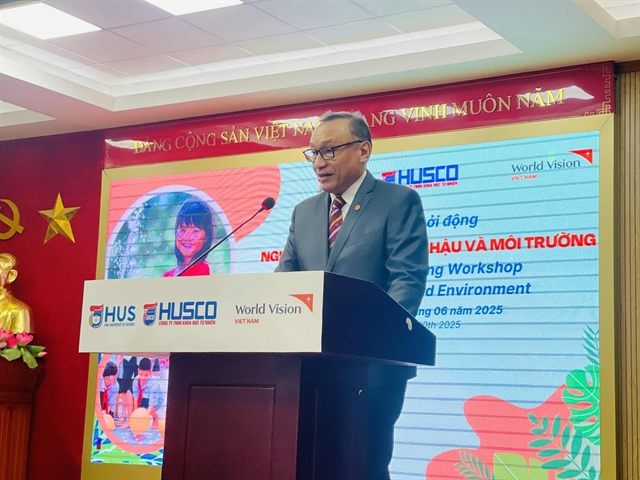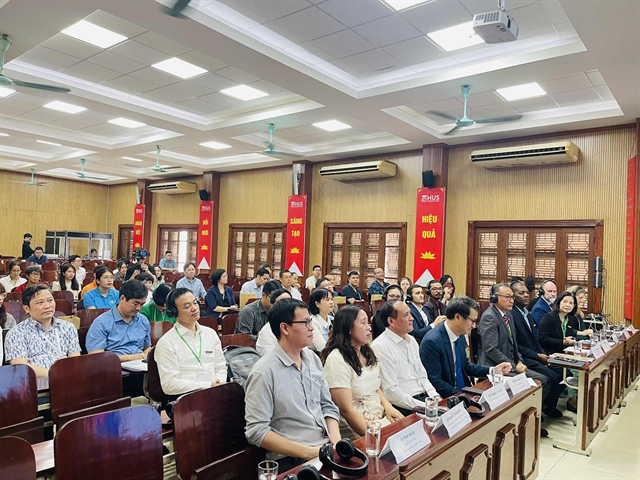 Society
Society


|
| The workshop offered a chance for experts to exchange experiences on climate change and environment research. — VNS Photo Thu Trang |
HÀ NỘI — Climate change is no longer a distant threat — it is a present and growing reality that is directly affecting our livelihoods, health, ecosystems, and security. For Việt Nam, with its long coastline, diverse terrain and a population largely dependent on agriculture and natural resources, these impacts are particularly pronounced and persistent.
That was the message from experts speaking during a workshop on Climate Change and Environment Research, which was co-organised by the HUS Company (HUSCO) under the University of of Science, Việt Nam National University-Hà Nội, in partnership with the World Vision International (WVI) in Việt Nam.
The event served as a platform bringing together stakeholders from academia, Government, civil society and the international community, to share experiences, identify common ground and co-develop actionable strategies.

|
| Doseba Sinay, Country Director of the World Vision International in Việt Nam, speaks at the event. — VNS Photo Thu Trang |
Speaking at the workshop, Doseba Sinay, Country Director of the WVI in Việt Nam, said that as an international humanitarian organisation, WVI believes solutions to climate and environmental challenges must begin at the community level.
He said: “Communities are not only the first to feel the impact of climate shocks but are also critical agents of change. Solutions that are rooted in the lived experiences, indigenous knowledge and local innovations of communities tend to be more adaptive, culturally appropriate and sustainable in the long term.”
Working with households in remote and vulnerable regions of Việt Nam, where people are directly affected by disasters, droughts, landslides and loss of livelihoods due to climate change, WVI realises that they are regions where the resilience of families is stretched daily, where access to education, healthcare and income opportunities is often disrupted by environmental instability.
“We have clearly seen that without reliable scientific evidence, community-based solutions lack effectiveness," Sinay said.
"And without community participation, research findings struggle to become actionable. This is why we champion models of co-creation, where evidence generated by academia informs practical interventions, and in turn, field realities inspire new research questions and directions.
"Only through such synergy can we close the gap between knowledge and impact.”
The workshop marked an important step in bridging research, action and resources.
Sinay told the audience: “It is not just a dialogue, it is a starting point for alignment. It will inspire meaningful actions ahead. By aligning the technical strengths of institutions with the contextual understanding of practitioners and the lived realities of communities, we can create scalable, adaptable solutions to climate resilience.
"We may together build a comprehensive, sustainable, and inclusive climate action network."
Such a network is essential for Việt Nam to meet its climate goals under the Paris Agreement, contribute to the Sustainable Development Goals (SDGs), and uphold its commitment to a low-carbon, climate-resilient future.
Associate professor Trần Ngọc Anh, Director of the HUSCO, said that he firmly believed that universities had a crucial role to play, not only in generating knowledge but also in helping address the practical challenges of society.
“We are fully aware that research and education alone are not enough," the professor said.
"It is essential that scientific knowledge be transformed into practical solutions that directly benefit society, especially vulnerable communities.”
In collaboration with WVI in Việt Nam, the HUSCO is conducting a range of practical initiatives to help reduce the impacts of climate change and natural disasters on local communities.
Anh said: “Climate resilience and environmental protection must be built not only with data and policies but also through people, participation and local knowledge.
"The joint efforts will result in scalable, sustainable climate adaptation models across various regions of Việt Nam.”

|
| The workshop brought together stakeholders from academia, Government, civil society and the international community. — VNS Photo Thu Trang |
Representatives expressed their hope that meaningful research–action partnerships will emerge, contributing to the development of climate adaptation models, ecosystem restoration efforts and enhanced community capacities. — VNS